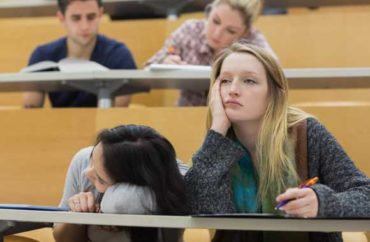
‘Something has to be done about tuition, something has to be done about student loans’: Georgetown economist
The number of young people ages 18 to 24 who are neither in college nor working “surged by about 1 million” over two years, from 2019 to 2021, according to an extensive analysis report from Newsweek.
Higher education enrollment decreased almost 10 percent over the past two years, resulting in 1.4 million fewer college students, according to the analysis, published Sept. 28 and headlined “Generation COVID: Record Numbers of Youth Opt Out of College, Work.”
Additionally, “just 51 percent of Gen Z teens are now considering a four-year degree—a 20-point drop since May 2020,” Newsweek reported, citing an analysis the news outlet commissioned done by Lightcast, billed as a data-driven labor market consulting firm.
Some students are forgoing college for immediate employment, while a significant percentage of young people have dropped out of both school and work: “Young men in particular are more likely to be disconnected; the percentage of young men not in school or working jumped from 12.4 percent in 2019 to 16.7 percent in 2021.”
Generation COVID’ is shunning college in ‘record numbers’
Population decline contributed to the drop in college-bound high schoolers, according to Newsweek. However, the demographic shift cannot fully explain the decrease.
“A sharp drop in births after the Great Recession led to a smaller number of college-age young adults today. But COVID did kick that decade-long slide into much higher gear,” the magazine reported.
“Three years into the pandemic, after two years of isolation, shuttered schools and virtual commencements, high school graduates…from the classes of 2020, 2021 and beyond—call them Generation COVID—are shunning college in record numbers.”
Students from families with lower incomes and some minority groups are opting out of college at “far higher rates” than others, the outlet reported, “worsening the existing gaps in educational attainment between whites and Asians versus other minorities.”
Those who work with young people say they’ve seen “significant apathy and disengagement” in thinking about life after high school, Newsweek reported.
Ken Coleman, a career and leadership coach at Ramsey Solutions, says students who have identified college as the wrong path struggle with finding alternatives.
“Some have decided that college is not worth the time and money, and a degree is not required to do what they want to do,” he told The Fix. “Some know college is not the right path but they are not clear on what the right path is, so they struggle in making a decision.”
Cost will be in student opportunity and shortage of skilled labor as well as debt, Georgetown economist said
David Crockett, a political scientist at Trinity University in San Antonio who teaches on American politics, told The Fix via email on October 10 that the pandemic, student debt, and university political correctness all have played a part in the shift away from college.
“It seems clear that the pandemic — and our response to it — was far more destructive than we think,” Crockett said. “We will be living with the consequences for quite some time.”
“It’s also possible that people are starting to count the cost of student debt — aided and abetted by the federal government,” Crockett said.
“Add to that mix the sense by a significant percentage of the population that colleges are being overwhelmed by woke ideology and all that that entails, and it further incentivizes [some] families like that to consider other options,” he said.‘
Another economist put some of the blame on tuition inflation and student loans.
“In some ways, the economy’s boom and bust cycles are going to significantly contribute to what we observe in student enrollment, but something has to be done about tuition, something has to be done about student loans,” according to Nicole Smith, chief economist of Georgetown University’s Center on Education and Workforce, in an interview over the phone.
The cost, however, is to the students’ opportunities in the future. “In the long run more education actually gets you more opportunities,” Smith says.
This trend will also have an effect on the greater economy by causing a “shortage of skilled supply of labor.” Not only will there be fewer skilled workers, but “we have so many highly skilled workers who are retiring and leaving,” Smith said.
MORE: Consider skilled trade careers, Chicago public school tells students
IMAGE: ESB Professional/Shutterstock





Please join the conversation about our stories on Facebook, Twitter, Instagram, Reddit, MeWe, Rumble, Gab, Minds and Gettr.